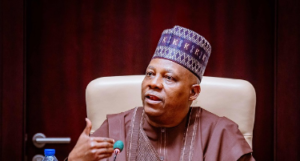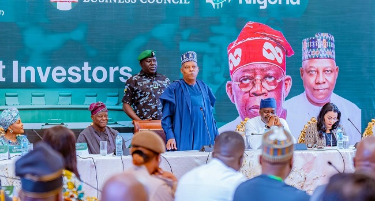Vice President Kashim Shettima has emphasized the urgent need for Nigeria to pivot away from its heavy reliance on oil and towards other promising sectors that offer substantial investment opportunities. Addressing the Existing Foreign Direct Investors Roundtable at the Banquet Hall of the Presidential Villa in Abuja, Shettima highlighted agriculture, manufacturing, renewable energy, and digital innovation as critical sectors ripe for exploration. These sectors, he noted, are in alignment with the nation’s development priorities as outlined in the Economic Recovery and Growth Plan (ERGP).
During his speech, Shettima, through his media aide Stanley Nkwocha, underscored that the eight-point agenda of President Bola Tinubu’s Renewed Hope administration presents various investment opportunities. “From agriculture to renewable energy, our agenda signals diverse avenues for investment,” he said. He further explained that through targeted incentives and public-private partnerships, the government aims to fully unlock the potential of these sectors, thereby catalyzing job creation and socio-economic empowerment across Nigeria.
Assuring investors of a business environment marked by transparency, accountability, and regulatory certainty, Shettima urged them to recognize the essential role of public-private partnerships. These partnerships, he emphasized, are crucial in mobilizing resources, sharing expertise, and mitigating investment risks.
Highlighting the substantial contribution of the non-oil sector to Nigeria’s economy, Shettima pointed out that it accounted for 93.62% of the GDP in the first quarter of 2024. This notable shift away from oil dependence, he argued, necessitates further exploration of diverse sectors such as agriculture, manufacturing, renewable energy, and digital innovation. “These sectors not only promise attractive returns but also align with our national development priorities outlined in the Economic Recovery and Growth Plan (ERGP) and subsequent blueprints,” he stated.
 Shettima also elaborated on the mechanisms adopted by the Tinubu administration to ease doing business in Nigeria. These measures, he explained, are designed to stimulate investment across critical sectors and strengthen the capacity of public institutions, ensuring that industry stakeholders are adequately supported. Emphasizing the broader impact of investments, Shettima noted that they are not just about financial returns but also about building lasting legacies and making enduring contributions to society. “Investments uplift communities, create sustainable livelihoods, and drive inclusive growth,” he said.
Shettima also elaborated on the mechanisms adopted by the Tinubu administration to ease doing business in Nigeria. These measures, he explained, are designed to stimulate investment across critical sectors and strengthen the capacity of public institutions, ensuring that industry stakeholders are adequately supported. Emphasizing the broader impact of investments, Shettima noted that they are not just about financial returns but also about building lasting legacies and making enduring contributions to society. “Investments uplift communities, create sustainable livelihoods, and drive inclusive growth,” he said.
The Vice President also praised President Tinubu’s visionary leadership and pro-business background, which he described as added incentives for investing in Nigeria under the current administration. Earlier, in his welcome address, the Deputy Chief of Staff to the President (Office of the Vice President), Senator Ibrahim Hadejia, commended the development partners, foreign investors, and other stakeholders for their participation in the meeting. He outlined the efforts made by the Tinubu administration to improve the investment climate in Nigeria, noting that many of the adopted measures are at various stages of implementation and are expected to yield significant results in the coming years.
In her remarks, Princess Zahrah Mustapha-Audu, the Technical Adviser to the President on Foreign Direct Investment (FDI), presented a summary report of a survey conducted to gather views on foreign investments in Nigeria. She highlighted that the findings from this survey would be critical to the administration’s efforts to enhance the investment environment. Mustapha-Audu explained that the roundtable was focused on seeking ways to retain and scale up investments in Nigeria, with the outcomes of the discussions aimed at bolstering existing frameworks and policies that encourage foreign direct investment.
The roundtable was attended by key government officials, including the Minister of Finance and Coordinating Minister of the Economy, Mr. Wale Edun; the Minister of Industry, Trade, and Investment, Dr. Doris Uzoka-Anite; the Managing Director of the Nigeria Sovereign Investment Authority (NSIA), Mr. Aminu Umar-Sadiq; the CEO of the Nigeria Investment Promotion Commission (NIPC), Aisha Rimi; and the Comptroller General of the Nigerian Immigration Service (NIS), Kemi Nandap. Representatives of the Central Bank of Nigeria (CBN), federal government agencies, the UAE Ambassador to Nigeria, H.E Salem Saeed AlShamsi, the leadership of the American Business Council, other diplomatic corps members, and technical partners were also present.
This gathering not only celebrated the capital flowing into Nigeria but also the confidence, trust, and partnerships that such investments represent. Vice President Shettima’s address underscored the administration’s commitment to fostering a robust, transparent, and investor-friendly environment, aiming to drive the nation’s economic growth through diversified investment in critical sectors.




